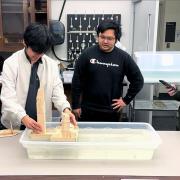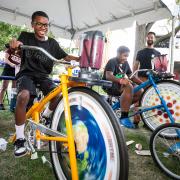When Latin American migrant families came to Chicago in growing numbers last year, South Side public schools scrambled to accommodate hundreds of new students, many of whom spoke little to no English.
School leaders needed extra support, and several Hyde Park school administrators, like Bret Harte Elementary School Principal Charles Bright, turned to longtime partners like the Office of Civic Engagement’s Neighborhood Schools Program for help.
“We didn’t have a ton of money in our budget allocated or reserved to help our new Spanish-speaking students, so the first thing we did was reach out to our community, and we just found a huge response from University of Chicago in particular,” Bright said.
This past fall NSP, which places UChicago students as tutors and teaching assistants in local classrooms, invited Spanish-speaking participants to help fill the need for tailored assistance for migrant students. Twenty NSP student employees and volunteers are currently supporting this population across five Hyde Park schools. NSP student recruitment for the initiative—in partnership with other units across campus such as the Pritzker School of Molecular Engineering—is ongoing.
At Bret Harte Elementary, UChicago first-year student Talia Crichlow works with small groups of Spanish-speaking second- and third-graders weekly. Crichlow, who’s studying history and education with hopes of one day becoming a teacher, helps the students read books or work through letter sounds and helps the teachers handle the extra workload of their already large classes.
“For us it’s been a struggle, just because we didn’t see something like this coming and most of our teachers don’t speak a second language, so finding materials and being able to translate classwork and to answer questions can be challenging. It’s already challenging teaching on a daily basis, and this is just an extra task for our teachers who want to do the best they can,” Bright said. “Talia is able to translate the students’ work. She can help with their fluency, help with their handwriting. She’s so hands-on—it just means the world to us and those students.”
On a recent Monday morning, Crichlow and a new second-grade student read aloud at a makeshift workstation in a Bret Harte hallway. Crichlow learned Spanish at home growing up in New York City and says working with these students has opened her eyes into how they’re processing the transition to a new city and culture, as well as an opportunity to support the local education system.
“Everyone is trying their best in whatever capacity that they have and working above and beyond to do what they need to do so I think it’s important to find ways to support people who work in those environments,” she said.
The experience was also a chance for Crichlow to connect with a community off campus.
“We’re uniquely located within a really strong residential area, and I think as a University it’s really important that we share our resources with that community, and not just financial resources, but there are lots of students here who can volunteer, who can do that work and address that, and I think it’s important to give back to the place where we live,” she said.
Meeting student needs
Megan Quigg, a third-year UChicago student, is working with a school counselor at Ray Elementary to incorporate elements of social emotional learning into her lessons with newcomer students from kindergarten through middle school, especially for students living in local migrant shelters. In addition to majoring in psychology, Quigg worked as a legal intern for a nonprofit in Washington state last summer. She said she is committed to making sure the students are getting a social and emotional outlet as well as more traditional English language support.
“I start each class with a meditation because that’s something that I really care about and then ask them how they’re doing and then try to get them to talk about how they’re feeling and put an English and Spanish word to the way that they’re feeling. That way they can communicate to teachers and their parents in Spanish what they need,” Quigg said. “The experience has been overwhelmingly rewarding, especially as I get to have personal connections with kids in my classroom. Every time I go in, I have one interaction, if not more, that make it totally worth it. These kids are really special.”
Supporting this initiative inspired Quigg to expand her UChicago studies to include public policy, which she has added as her double major.
“It’s difficult to make policy that is impactful and meaningful if you haven’t been in the shoes of those that policy is oriented to, so … seeing the ways that these kids’ needs are not being met despite the fact that policy makers want the best for them, I definitely have an interest in pursuing that in some capacity,” Quigg said. “I’m interested in working in some kind of policy realm that’s aimed at making schools be a place that allows kids to thrive.”
Finding deeper connections
Other UChicago student participants are drawing from their own personal experiences as they connect with the young newcomers they’re supporting. Lucas Zubillaga, a third-year physics and molecular engineering major who grew up in Spain and only attended Spanish-speaking schools until high school, is working with high school students at Kenwood Academy. He says he sees his younger self in some of the struggles the newcomer students are facing.
“Shifting your mindset from studying everything in Spanish to studying everything in English is challenging in itself but just adding that layer of difficulty, not being able to speak fluently in English, is so challenging, so I can’t even imagine how hard it must be for these kids. That’s one of the reasons why I wanted to join the program,” Zubillaga said. “Obviously my background is very different, but I told them: ‘Hey, look, I had to do the same thing, it’s tough at first but with time it just gets a lot better.’”
At Beulah Shoesmith Elementary School, UChicago master’s student Daniela Roscero Cervantes relates to her students having migrated from Mexico to suburban Houston as a teen. Roscero Cervantes, who is studying social sciences, helps groups of up to seven students on her weekly visits to the school by going over that day’s lesson in Spanish or reviewing specific assignments.
“I was in their shoes when I first moved to the U.S., and it can be very overwhelming and sometimes a little lonely, so being there for them is very important,” Roscero Cervantes said. Most of the goals of post-secondary education, she said, somehow tie to helping others or making a positive impact.
Rather than waiting until she’s done with her University years to make that impact, Roscero Cervantes said she’s happy to be engaging now. “You get a lot more out of your college experience if you get out into the community instead of being isolated.”
—Adapted from a story that was first published on the Office of Civic Engagement website.

